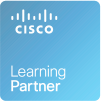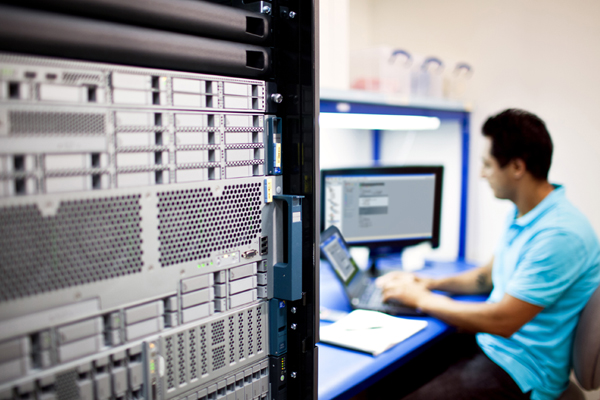Sobre o curso Designing Cisco Data Center Infrastructure (DCID)
Carga horária: 40 horas (5 dias)
Currículo, objetivos do curso, ementa e informações gerais (em inglês)
Course Description
The Designing Cisco Data Center Infrastructure (DCID) course focuses on data center design based on Cisco solutions and technologies. The course includes theoretical content, as well as design-oriented case studies that are in the form of activities. The course is designed to help students prepare for Cisco CCNP Data Center certification and for professional-level data center roles.
The course includes information on designing data centers with Cisco components and technologies. It covers network designs with virtualization, Layer 2 and Layer 3 technologies and routing protocols, and data center interconnect design options. Also covered are device virtualization technologies such as virtual data centers and network function virtualization with virtual appliances, including virtual switches, virtual routers, and virtual firewalls. Storage and SAN design is covered, with explanation of Fibre Channel networks and Cisco Unified Fabric. Design practices for the Cisco Unified Computing System (UCS) solution based on Cisco UCS B-Series and C-Series servers, Cisco UCS Manager, and Cisco Unified Fabric are covered. Network management technologies include UCS Manager, Cisco Prime Data Center Network Manager (DCNM), and UCS Director.
You’ll master the professional-level skills and technologies needed to design data center infrastructure based on Cisco and other industry pervasive technologies.
Course Prerequisites
To fully benefit from this course, students attending this training should have completed the following courses or obtained the equivalent level of knowledge:
- Introducing Cisco Data Center Networking (DCICN) v6.0 or higher
- Introducing Cisco Data Center Technologies (DCICT) v6.0 or higher
- Configuring Cisco Nexus 9000 Series Switches in ACI Mode (DCAC9K) v2.0 or higher
- Good understanding of the VMware environment
It is recommended, but not required, to have the following skills and knowledge before attending this course:
- Describe data center networking concepts
- Describe data center storage concepts
- Describe data center virtualization
- Describe Cisco UCS
- Describe data center automation and orchestration with a focus on Cisco ACI and Cisco UCS Director
- Identify products in the Cisco data center Nexus and Cisco MDS families
- Describe network fundamentals and build simple LANs, including switching and routin
Course Objectives
Upon completion of this course, you will be able to:
- Describe the Layer 2 forwarding options and protocols used in a data center
- Describe the Layer 3 forwarding options and protocols used in a data center
- Describe the rack design options, traffic patterns, and data center switching layer access, aggregation, and core
- Describe the Cisco OTV technology that is used to interconnect data centers
- Design a solution that uses LISP for traffic forwarding
- Describe the hardware redundancy options and virtualize the network, compute, and storage. Discuss virtual networking in the data center.
- Describe solutions using fabric extenders and compare Adapter FEX with VM-FEX
- Describe the Cisco Nexus 1000V solution to extend the hypervisor functionality
- Describe security threats and solutions in the data center
- Describe advanced data center security technologies and best practices
- Describe virtual appliances that are deployed in a data center network
- Describe device management and orchestration in the data center
- Design a data center storage network
- Describe the storage options for the compute and the different RAID levels from a HA and performance perspective
- Describe Fibre Channel concepts and architecture
- Describe Fibre Channel topologies and industry terms
- Describe how Ethernet and Fibre Channel networks converge
- Describe security options in the storage network
- Describe management and automation options for the storage networking infrastructure
- Describe Cisco UCS servers and use cases for various Cisco UCS platforms (B-Series and C-Series)
- Explain the connectivity options in the Fabric Interconnects for south- and northbound connections. Describe port personalities and oversubscription models. Distinguish between the EHV and switching mode, and between the NPV and Fibre Channel switching mode. Describe split brain and partition in time issue with the Fabric Interconnects for HA.
- Describe the hyper convergence solution and how it integrates systems based on different storage vendors. Compare storage vendors and evaluate the advantages for each stacked solution.
- Describe the different management options for Cisco UCS. Design the management solution in HA mode and describe integration with the Cisco UCS domain.
- Describe a Cisco UCS design using different applications and scenarios
- Describe the system-wide parameters to setup a Cisco UCS domain including monitoring, QoS, and organizations to build up a management hierarchy in the Cisco UCS domain
- Describe RBAC and integration with directory servers to control access rights on Cisco UCS Manager
- Describe the pools that may be used in service profiles or service profile templates on Cisco UCS Manager. Describe the design and best practices for naming conventions.
- Describe the different policies you may set in the service profile to achieve and fulfill customer or application requirements
- Describe the Ethernet and Fibre Channel interface policies and additional network technologies
- Describe how to use templates to work more efficiently in Cisco UCS Manager
Job Roles
- Network Designer
- Network Administrator
- Network Engineer
- Systems Engineer
- Consulting Systems Engineer
- Technical Solutions Architect
- Cisco Integrators/Partners
Faça seu treinamento com os melhores
Pagamentos no PagSeguro com segurança e flexibilidade em até 12 vezes
Ementa do Curso
- Module 1: Data Center Network Connectivity Design
- Lesson 1: Describing High Availability on Layer 2
- Lesson 2: Designing Layer 3 Connectivity
- Lesson 3: Designing Data Center Topologies
- Lesson 4: Designing Data Center Interconnects with Cisco OTV
- Lesson 5: Designing a LISP Solution
Module 2: Data Center Infrastructure Design
- Lesson 1: Describing Hardware and Device Virtualization
- Lesson 2: Describing FEX Options
- Lesson 3: Describing Virtual Networking
- Lesson 4: Describing Basic Data Center Security
- Lesson 5: Describing Advanced Data Center Security
- Lesson 6: Describing Virtual Appliances
- Lesson 7: Describing Management and Orchestration
Module 3: Data Center Storage Network Design
- Lesson 1: Describing Storage and RAID Options
- Lesson 2: Describing Fibre Channel Concepts
- Lesson 3: Describing Fibre Channel Topologies
- Lesson 4: Describing FCoE
- Lesson 5: Describing Storage Security
- Lesson 6: Describing SAN Management and Orchestration
Module 4: Data Center Compute Connectivity Design
- Lesson 1: Describing Cisco UCS Servers and Use Cases
- Lesson 2: Describing Fabric Interconnect Connectivity
- Lesson 3: Describing Hyperconverged and Integrated Systems
- Lesson 4: Describing Management Systems
- Lesson 5: Describing Hadoop, SAP Hana, and IoT on Cisco UCS
Module 5: Data Center Compute Resource Parameters Design
- Lesson 1: Describing Cisco UCS Manager System-Wide Parameters
- Lesson 2: Describing Cisco UCS RBAC
- Lesson 3: Describing Pools for Service Profiles
- Lesson 4: Describing Policies for Service Profiles
- Lesson 5: Describing Network-Specific Adapters and Policies
- Lesson 6: Describing Templates in Cisco UCS Manager
Conheça mais sobre a nossa visão sobre as certificações da Cisco aqui!
Valores do Investimento
- Reais (BRL): R$ 5.000,00
- Cisco Learning Credits (CLC): 13
OBS: preços válidos para treinamentos presenciais na cidade do Rio de Janeiro ou para treinamentos VILT (Online/WebEx).


Próximos Treinamentos Designing Cisco Data Center Infrastructure (DCID)
abril 2025
Sem Treinamentos / Eventos
maio 2025
Sem Treinamentos / Eventos

